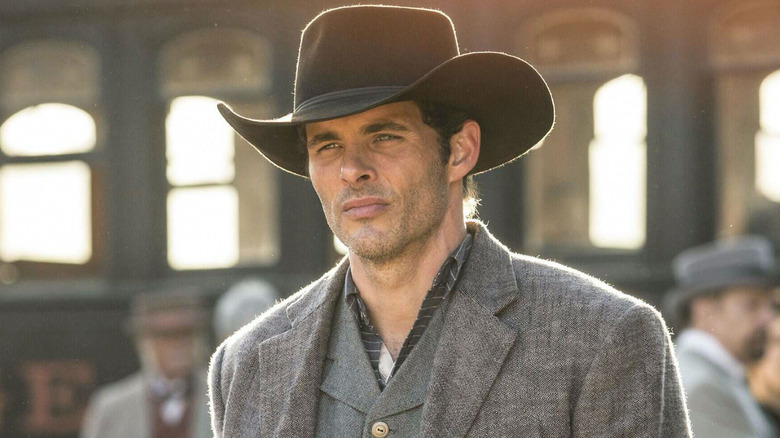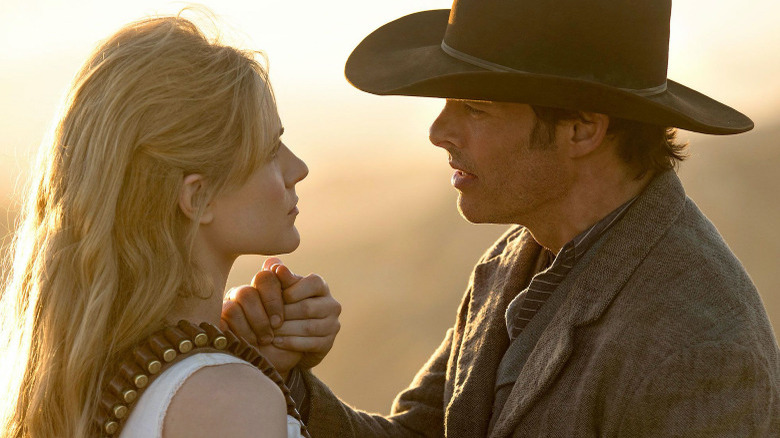Westworld Star James Marsden Reacts To The Show's Surprise Cancelation
HBO's "Westworld" was a lot like the android "hosts" that populate the titular Old West theme park. It never failed to look great (showrunners Lisa Joy and Jonathan Nolan spared no expense, to quote a character from a different Michael Crichton adaptation), even when you had little to no clue what was actually going on inside its head, which was most of the time after the first season.
Therein lies both the show's greatest strength and what proved to be its downfall. I've often said the storytelling on "Westworld" felt like the result of Joy, Nolan, and the show's other writers trying to constantly out-galaxy-brain one another. The series would tie its plot into knots while jumping back and forth in time. Sometimes, this was a way to put you in the shoes of the hosts, most of whom spent season after season struggling to achieve a greater sense of autonomy and identity. Other times, it mostly felt like an excuse for Joy and Nolan to f*** with you. And I didn't mind... mostly. The terrific production values and big sci-fi ideas (or, as the kids like to put it, "the vibes") were enough for me.
By that same token, this meant "Westworld" was "not an easy show to love" (to quote /Film's own Danielle Ryan) if you weren't on its wavelength. This is also why the series' viewership tumbled from 12 million viewers for its first season to four million for its fourth and final outing, even as the budget swelled from $100 million to, at least, $160 million (via The Hollywood Reporter). All the same, its official cancelation back in November 2022 caught certain people (namely, those weirdos who don't obsessively track TV viewership statistics, can you even imagine?) off-guard, longtime cast members like James Marsden among them.
'I just wish it was about more than financial success'
James Marsden, who played Theodore "Teddy" Flood (a good-natured gun-slinging host prone to being killed by guests and even other hosts — the Kenny McCormick of "Westworld," if you will) across multiple seasons, reflected on the show's cancelation during an interview with Rolling Stone. "I'd be lying to you if I told you that the way we ended 'Westworld' wasn't a disappointment," Marsden admitted, quickly clarifying:
"I'm never going to speak without gratitude about any of my experiences, but it would have been nice to be able to complete the story we wanted to finish. I love this 'Westworld' family. It was one of those unique opportunities to be part of something where I also would be sitting at home ravenously waiting for the next episode as a fan."
As easy, and not unfair, as it would be to blame the series' premature termination on Warner Bros. Discovery CEO David Zaslav and his "Business first, art last" philosophy (which has already led to some pretty dang alarming trends in the greater world of streaming), Marsden knows "Westworld" was a costly show to make and "big shows have to have big audiences" to warrant all that spending. "I just wish it was about more than financial success," he added.
Hear, hear. I can personally vouch that the hours I spent joyously racking my brains trying to make head or tails of the more perplexing plot points on "Westworld" (seriously, did Serac die on the way to his home planet after the third season, or did I just miss something?) will linger in my memory long after whatever far less interesting series WBD spends its money on instead of "Westworld" have come and gone. You can't put a price tag on that.

